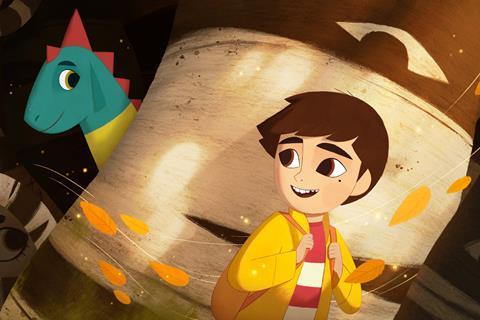Cartoon Saloon’s latest feature could bring the company a fifth Oscar nomination. My Father’s Dragon director Nora Twomey and producer Paul Young tell Nicholas Barber about the journey to bring the quest tale to life.

For a small independent studio, Cartoon Saloon has had some outsized triumphs. Based in Kilkenny in Ireland since 1999, the company has made five animated features, all of them jewels of lyrical storytelling and hand-drawn animation (with some digital help). The first four — The Secret Of Kells, Song Of The Sea, The Breadwinner and Wolfwalkers — all received Oscar nominations for best animated feature. Is the pressure on for their latest film, My Father’s Dragon, to make that five in a row?
Nora Twomey, the animation’s director, and one of the studio’s three co-founders, frowns at the idea. “It took about five years to make it, from screenplay through to final mix,” she says. “It would be odd if you were doing that just to wear dresses and high heels.”
Paul Young, another of Cartoon Saloon’s co-founders, dismisses the proposition, too. “If you get a film finished and you’re still alive, you should get a prize,” he says. “Maybe a badge and a ticker-tape parade.”
Cartoon Saloon has certainly earnt its parade for My Father’s Dragon, as the film’s genesis took a lot longer than the five years mentioned by Twomey. The novel by Ruth Stiles Gannett, first published in 1948, had been a childhood favourite of Meg LeFauve, the screenwriter of Pixar’s Inside Out and The Good Dinosaur. When she learned that the screen rights were available, LeFauve suggested it to the bosses of Los Angeles-based Mockingbird Pictures, Julie Lynn and Bonnie Curtis, and they in turn pitched it to various animation studios. “One of them said that they could do the film a bit like The Secret Of Kells,” says Young, “so [Lynn and Curtis] said, ‘Why don’t we just take it to The Secret Of Kells people?’”
One of The Secret Of Kells people was Twomey, who co-directed that film with Tomm Moore (Cartoon Saloon’s third co-founder), before making The Breadwinner as a solo director (she also has a producer credit on Wolfwalkers). When Lynn met her and Young in Dublin in 2012, Twomey was convinced that she should take on My Father’s Dragon after reading the book’s opening pages.
The novel tells the tale of Elmer, a boy who travels to the magical Wild Island to rescue Boris, a cuddly striped dragon. But before his quest begins, he upsets his single mother by bringing a stray cat back to their rundown apartment, not quite appreciating that they can barely afford to feed themselves. “The complexity of that scene struck me,” says Twomey. “We’ve all had moments as a child when someone has made us afraid and we’re not sure why, or as a parent when you have to manage what you say because you don’t want to scare your child. I saw the potential to make a film that explored ideas like that in an accessible way.”
A Japanese cartoon version of the book, Elmer No Bōken (1997), had stuck faithfully to Stiles Gannett’s text, but Twomey and her team imagined a more poignant, less episodic version that took inspiration from the source material, rather than simply adapting it. Several outlines were drafted by LeFauve and her writing partner John Morgan, who died of cancer during the process in 2016 — and together the Mockingbird and Cartoon Saloon producers won over Netflix’s fledgling animation division. “It was a really emotional kind of pitch,” says Twomey of their meeting in Los Angeles. “I’d never been in a room before where executives cried at the end.”
Comfort zone
The streaming giant’s imprimatur was a sea change for a company that had previously raised money from three or four different financiers per film. “With European co-financing, you’re always as slow as your slowest financier,” says Young, who produces the film alongside Moore, Curtis and Lynn. “When you have one great big funder like Netflix, then you don’t have to worry about stitching together the Franken-financing monster.”
Neither he nor Twomey will specify the budget they secured from that “one great big funder”. “A little red dot appears on my forehead if we talk about that,” jokes Young. And both rebut any notion that the Netflix deal was a factor in My Father’s Dragon being an epic adventure, with more locations, characters and action sequences than their previous features. “Every film that we approach, we ask the main character what they need in order to visualise the story,” insists Twomey. “It looks the way it needed to look for Elmer to express his journey, and for the film to feel immersive.”
But the pair do admit that the Netflix funding brought significant advantages. They could hire a starrier voice cast than usual, including Whoopi Goldberg, Ian McShane and Jacob Tremblay as Elmer. And they could record an orchestral score in Abbey Road Studios, “which was sublime”, says Twomey. They also acknowledge that without Netflix, they couldn’t have kept going through the Covid-19 pandemic.
Lockdown made the production “about a third harder” than it would otherwise have been, estimates Twomey. “It had its pros and cons,” adds Young, “but there were some amazing pros. Some people piped up in the [online text] chat who wouldn’t have done so verbally. Different personalities come out stronger in different forms of interaction.”
If there is one downside to the Netflix deal, it’s that My Father’s Dragon — which launched at BFI London Film Festival in October — was barely in cinemas before appearing on the streaming platform in November. Given how rich the film is, with lush and leafy design, it’s a shame that more people couldn’t see it on a big screen. But Twomey and Young don’t agree.
“It’s wonderful to see it on a big screen,” says Twomey, “but it’s more wonderful that the story gets into the hands of someone who might need it — someone of any socioeconomic group, anywhere in the world. We’ve had nice emails from young people in particular — children who have lost their footing, or people who felt they were unsafe as children. If the film can get into their hands, even if it’s on a phone rather than a cinema screen, that’s a sacrifice I’m willing to make.”
“Anyway,” chips in Young, “a lot of people have big TVs these days…”
















![[L-R]: Amanda Villavieja, Laia Casanovas, Yasmina Praderas](https://d1nslcd7m2225b.cloudfront.net/Pictures/274x183/6/4/1/1471641_pxl_20251224_103354743_618426_crop.jpg)








No comments yet